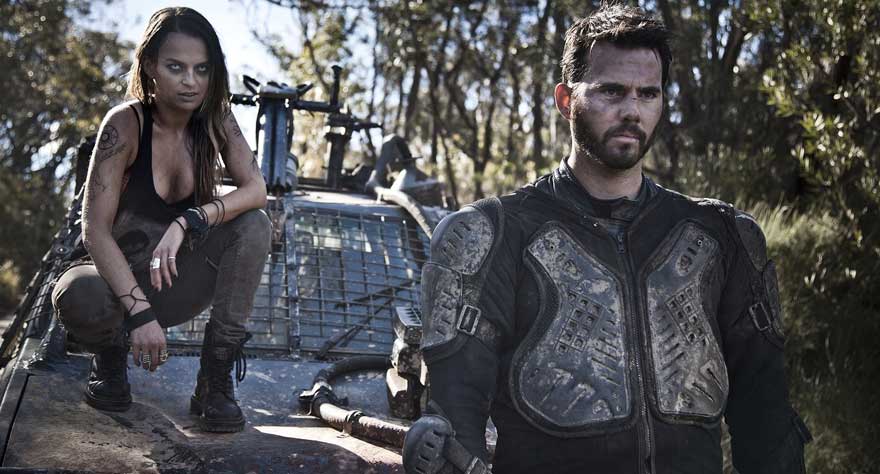
Camp abounds in this Australian apocalyptic-style zombie film.

Camp abounds in this Australian apocalyptic-style zombie film.
Despite what you may think, the zombie genre is rife with possibility. Already it’s been used as a backdrop for some seriously inspired comedies (Sean of the Dead, Zombieland, Dead Snow), great horror films (Night of the Living Dead, 28 Days Later), awesome action (World War Z), and the occasional romance as well (Warm Bodies, Life After Beth). Zombies hover between life and death in a moral grey area that makes for intriguing scenarios—not to mention mindless violence. For all such reasons, it’s easy to be pretty open minded when it comes to zombie films. Wyrmwood: Road of the Dead does indeed bring some new elements into its zombie narrative, but for the most part puts all the familiar elements through the wash, and has just enough camp to call into question how serious it’s really taking itself.
Directed by Aussie filmmaker Kiah Roache-Turner, and co-written with his brother Tristan Roache-Turner, the film’s Australian setting makes its post-apocalyptic premise a strong choice. That they clearly went into Mad Max territory is obvious, but a decision that works for the film’s aesthetic. From the film’s beginning it isn’t entirely clear whether or not we’re meant to feel somber around the events that have apparently recently unfolded. Immediately we’re told, campfire style, a story around one man’s survival when he runs into some zombies in the outback. Without much warning the timeline flips and the film begins again, this time pre-epidemic.
Barry (Jay Gallagher), our protagonist, at home with his wife and daughter enjoy dinner and banter. In her rusted old barn, Barry’s sister Brooke (Bianca Bradey) is holding a gothic-style photo shoot, her subject hanging from a hook. Clearly a certified badass, with the eyeliner to prove it, Brooke snaps away when without much warning her model jerks on her chains, her eyes glazing over and she lashes out, trying to bite Brooke. Brooke’s assistant gets in the way of things and finds herself bit and bloody—and then shortly thereafter zombie-fied—as Brooke climbs into the rafters to escape. Simultaneously, Barry’s daughter wakes him in his room to declare there is someone in the kitchen. He investigates and finds a zombie eating his uncooked meat and he and his wife are forced to violently—and with as much gore as possible, keeping with the norms of the genre—axe the man.
Barry and family jump in the car, but the epidemic appears to be airborne and soon Barry is forced to kill his own wife and daughter. Heavy stuff for the beginnings of a zombie tale. Backwards storytelling and pacing issues aside, the film finds its foothold when Benny (the campfire storyteller), played with sustainable energy by Leon Burchill, joins Barry on his quest to find his sister. Finally we’re given a character who embodies the sort of screwy and preposterous vibe the film’s been hinting at but not committing to.
The most squirm-inducing scenes involve Brooke, taken prisoner by unidentified armed men and experimented on in a small room of chained up zombies by a mad doctor in a hazmat suit. Here’s where the film goes full-blown B-movie with every unsterilized syringe and squirt of blood adding to the cheese. Apparently Brooke (and her brother) are immune to the zombie disease. Later it’s revealed this has to do with their blood type, but in the meantime Brooke endures epidural injections of zombie spinal fluid, theoretically to see at what point she’ll finally turn. Instead, the experimentation has unexpected results.
In the meantime, Barry is making some rather farfetched discoveries of his own. Mainly that the country’s gasoline has suddenly evaporated and that the zombies are actually full of a sort of gas, that not only powers their late night outbursts of attack-energy, but that can be used to fuel a car. Barry, Benny, and a few new guys they pick up, concoct a battle vehicle (the most Mad Max-ian aspect of the film) powered by zombies and reinforced with steel cages. Out they go to find Brooke and keep alive in a world of gas-breathing zombies.
Weirdly what the film ends up doing right is layering on the cheese and emphasizing its blown out visuals which do well to add to the film’s apocalyptic feel. Its more serious moments are a waste, and it shoots itself in the shin slightly at the end when it attempts to invoke some emotion during a final standoff.
There are serious plot holes and missing motivations, and as the zombie genre has matured viewers have begun to expect certain things. Like even the most basic of explanations for the decimation of much of the population. Wyrmwood never attempts to offer any such explanation, and worse never clarifies who its main villains are either. Are they military? Crazy scientist cult? How did they assemble so quickly during the apocalypse and what is the point of their experiments on Brooke when they don’t seem to care at all about a cure?
The film’s biggest twist is certainly one I’ve never seen done before in a zombie film and therefore interesting, but of course is more about plot device than character definition. The action satisfies, the camp could have been layered on a bit more thickly, and the jokes are likely to work best on Australian audiences, but overall Wyrmwood is a fun entry into the growing zombie catalog, though it will never be genre-defining.